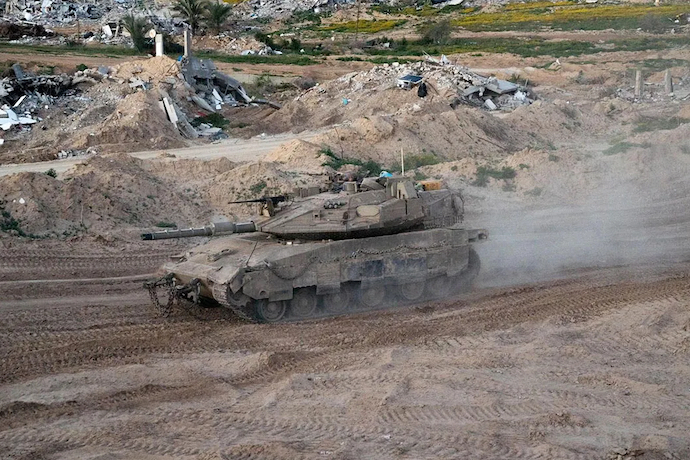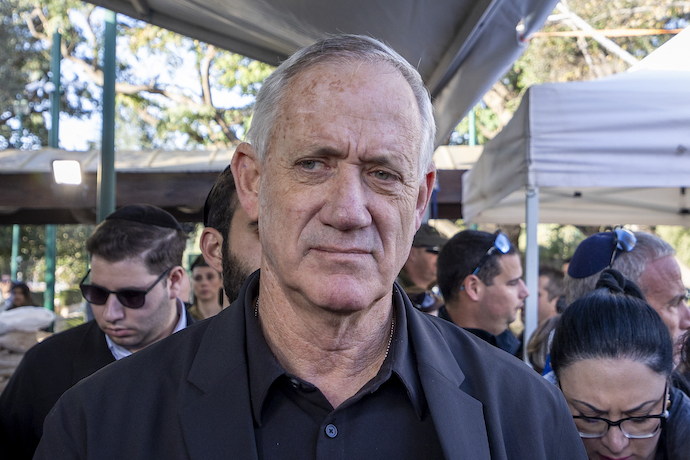The Platform
Latest Articles
by Abdul Mussawer Safi
by Sohail Mahmood
by Mutalib Jibril
by Ikram Ali
by Kanan Heydarov
by Manahil Jaffer
by Mutalib Jibril
by Sehr Rushmeen
by Gordon Feller
by James Carlini
by Abdul Mussawer Safi
by Sohail Mahmood
by Mutalib Jibril
by Ikram Ali
by Kanan Heydarov
by Manahil Jaffer
by Mutalib Jibril
by Sehr Rushmeen
by Gordon Feller
by James Carlini
The Shadow and Echo of Potential Conflict: The Iran-Israel Escalation
The concern that the war in Gaza could spread is coming to fruition.
In the early hours of April 13, 2024, a calculated barrage of more than 300 drones and missiles were dispatched by Iran, hurtling toward Israel, only to be met with a wall of interception, as nearly all were dismantled by Israel’s vigilant defense systems. This assault was not without its parallel, as Lebanon’s Hezbollah—an ally to Iran’s regional ambitions—launched rockets at an Israeli base on the same day. Israel’s response was to strike back, targeting a Hezbollah position within Lebanon’s sovereign borders on April 14, 2024. Meanwhile, the ripples of the conflict were felt as far as the Red Sea, where Yemen’s Houthi rebels, aligning themselves with Iran’s cause, assailed maritime lanes.
The genesis of this recent escalation was traced back to a prelude on April 1, 2024, when Israel executed an attack on an Iranian diplomatic enclave in Damascus. The offensive resulted in the deaths of seven IRGC members, including two high-ranking commanders. This clash of forces was itself a successor to a series of skirmishes stoked by the war in Gaza. The subsequent seizure by the IRGC of a cargo ship linked to Israel in the strategic Strait of Hormuz served to underscore the broader implications for global commerce and the fragility of peace.
In the United States, President Biden vocalized his repudiation of the Iranian offensive and the dire need for diplomatic endeavors to thwart the march toward greater military conflict. As Israel stands in the wake of its own defense success, the Foreign Minister broaches the potential for retaliatory action against Iran. Conversely, Iran’s president telegraphed a stark warning: any Israeli counterstrike would be met with a reaction both decisive and formidable.
Amidst the fraught political landscape, President Biden’s administration continued to press for an avoidance of military escalation, postulating that Israel’s display of strategic defense might render further retaliation unnecessary. This perspective was communicated to Israeli leadership as a strategic victory in itself, potentially obviating the need for additional military engagement.

The question persists as to whether Prime Minister Benjamin Netanyahu will heed this counsel. The assertive declarations of Israeli war cabinet member Benny Gantz on April 14 were not ambiguous, asserting that a strategic and timely response would be extracted from Iran. “We will exact a price in Iran, in the manner and at the time that is right for us,” Gantz is quoted as saying.
Abubakr Al-Shamahi, contributing to Al Jazeera, cogently observes the likelihood of Israeli military action in response, arguing that Netanyahu’s history of firm stances against Iran is likely to precipitate action. His reputation as a defender against Iran’s influence and his advocacy for a robust military stance bolster the hypothesis of inevitable Israeli action.
Abubakr Al-Shamahi writes: “What comes next? There is a high chance that Israel will respond militarily in some capacity. Prime Minister Benjamin Netanyahu, who has long projected himself as a security hawk and the man to keep Iran in its place, is unlikely to allow a direct attack from Iran go without a response. Israel, especially right-wingers like Netanyahu, prides itself on the perception that it is the primary military power in the Middle East, and deterrence is vital to maintaining that image, particularly after the damage Hamas did during its October 7 attacks on Israel.”
However, the danger of such reciprocal hostilities lies in the potential for grievous miscalculation, with an escalation to all-out war a conceivable outcome. This prospect reminds us that when events can unravel, they often do, with the specter of unintended consequences looming large. Thus, the measured pace of Israel’s military deliberations reflects both a prideful and sagacious approach. The world’s leadership, keenly aware of the situation, applies significant pressure on Israel, cognizant of Netanyahu’s perception of Iran as an existential foe.
Meanwhile, the toll of the Gaza war unfolds with a relentless grimness: casualties mount and the specter of famine casts its long shadow across the territory. As the United Nations sounds the clarion call of impending humanitarian catastrophe, the global community fixates on the Middle East, advocating for a cessation of hostilities and temperance in the face of rising tensions.
Amidst this turbulence, Western nations are deliberating a new cadre of sanctions aimed at Iran, a punitive response to its audacious attack on Israel. The United States, articulated through National Security Adviser Jake Sullivan, is poised to erode Iran’s military capabilities with forthcoming sanctions, while the European Union contemplates augmenting its punitive measures to thwart future aggression and demand restraint.
Yet, Prime Minister Netanyahu’s contemplative stance on retaliation is not solely a matter of geopolitical strategy; it is also a reflection of Israel’s internal complexities, with domestic discontent casting long shadows over governmental decisions.
The contours of Israel’s prospective reprisal appear symbolic rather than expansive, indicating a calculated approach. However, the broader concern anchors on the instability that such maneuvers might unleash across the region, potentially spiraling beyond control. It falls upon the shoulders of the U.S., alongside Britain and France—nations that have bolstered Israel’s defenses—to shepherd a movement toward de-escalation. The cumulative calls for moderation from global and Arab states alike on April 14, 2024, serve as a chorus against the drumbeat of war. Chancellor Olaf Scholz’s visit to China became a platform for such advocacy, underscoring the criticality of restraint, particularly from Iran.
“We will do everything to stop a further escalation,” Scholz said on a visit to China. “We can only warn everyone, especially Iran, against continuing this way.”

The Biden administration stands at a crossroads, seeking the dual outcomes of ensuring Israel’s defense without the encumbrance of a protracted conflict. This delicate balance is evident in President Biden’s circumspect approach to U.S. involvement in potential Israeli offensives against Iran, with the intent of forestalling any dreaded escalation.
Amidst this strategic calculus, senior Israeli ministers signaled a reticence for imminent action, favoring instead the formation of a regional coalition. “We will build a regional coalition and exact the price from Iran in the fashion and timing that is right for us,” declared centrist minister Benny Gantz, echoing a sentiment of strategic patience and alliance.
Defense Minister Yoav Gallant seized on this momentary respite to advocate for a strategic alliance against the looming Iranian threat—threats, he notes, that extend to potential nuclear capabilities, a charge Iran has historically denied.
The Iranian military’s voice, Major General Mohammad Bagheri, took to the airwaves with a stern warning: any Israeli retaliation would be met with a forceful Iranian response, extending the specter of conflict to U.S. assets should they facilitate Israel’s retribution.
Within Iran, the recent assault on Israeli territory stands as a domestic rallying cry more than an effort to exact tangible destruction—a maneuver to maintain face in light of recent vows of revenge, while carefully sidestepping the maw of a new war. Iran’s history of indirect confrontation through proxies, like Hezbollah and the Houthis, underscores its awareness of Israel’s formidable retaliatory capabilities, supported by the U.S.
Nevertheless, Iran’s direct assault marks a departure from this historical pattern, signaling a potential paradigm shift in the Middle East—the first instance of Iran engaging Israel from its own territory, an act that, while militarily ineffectual due to Israel’s defenses, bears significant political weight in Tehran and among its global allies.
The Iranian initiative, while novel in its directness, seemed less designed for tactical impact than for internal resonance. Iran, mindful of the balance of power and its historical strategy, has avoided a wider regional war. Yet the imperative for vengeance—sparked by the loss of IRGC leaders in Damascus—demanded a display of force. As Iran faces internal pressures, it opts for measured retaliation, likely limited to Hezbollah and Houthi-led strikes, meticulously avoiding civilian harm to maintain the narrative of restrained vengeance.
The Biden administration, meanwhile, navigates a domestic tightrope, balancing robust rhetoric with the imperatives of geopolitical stability. Republican critics brandish accusations of timidity, prompting a demonstrative, though calculated, posture.
The latest escalation not only ratchets up regional tension but also ushers in a new era of direct conflict potential. While the military impact of Iran’s strike was curtailed by Israel’s defenses, its broader implications ripple through diplomatic channels. For the first time, military support to Israel extended beyond its capabilities to include active assistance from American, British, and French forces.
The European Union and Britain have voiced strong objections to Iran’s aggression, contrasting with a more muted response from the Muslim world. Turkey’s call for restraint reflects a shared desire to avert further tension. The April 14 statements from Arab states Egypt, Qatar, and the United Arab Emirates reinforce this appeal for moderation.
In the wake of the assault, global leaders convened—the G7 and the UN Security Council—to deliberate responses and ramifications. Israel’s plea to classify the IRGC as a terrorist entity frames the Security Council’s agenda, with Iran’s president forecasting a severe response to any Israeli aggression. The IRGC’s commander reinforced this stance, indicating a broadening of Iran’s retaliatory scope should Israel proceed.
Amidst these strained circumstances, a long-term resolution remains elusive. Advocates argue that only a two-state solution guaranteeing Palestinian sovereignty can forge enduring peace. Yet, political will from key international players seems absent, portending further instability.
In summary, while confrontation between Iran and Israel materialized unexpectedly, neither seeks an expansive conflict. Global powers, including the U.S., China, and Russia, hold stakes in maintaining regional equilibrium, suggesting that a full-scale military engagement is improbable.
Thus, the direct Iranian strike, while a shift in operational doctrine, does not predicate an immediate regional war. However, it undeniably alters the strategic landscape, setting a new precedent in the shadow conflict that has long simmered between Iran and Israel. As the geopolitical narrative unfolds, the persistence of regional tension seems inevitable, with the Palestinians bearing an inordinate burden amidst the turmoil—a plight that echoes as an appeal for a more just and sustainable peace.
Sohail Mahmood is an independent political analyst focused on global politics, U.S. foreign policy, governance, and the politics of South and West Asia.
